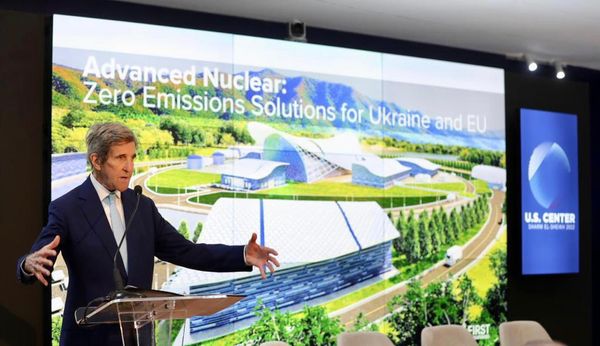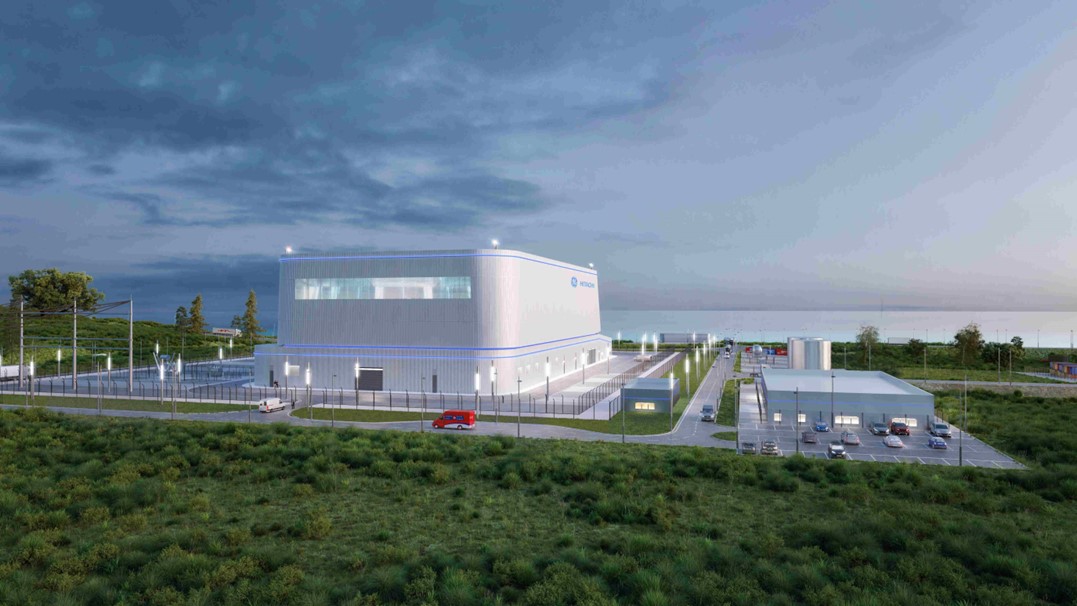Ontario’s SMR plans for Darlington advance

The Ontario government has announced the start of site preparation at the Darlington nuclear power plant for Canada’s first grid-scale small modular reactor: GE Hitachi Nuclear Energy’s (GEH) BWRX-300.
-3 2x1.jpg)
A message from Curtiss-Wright
High-Temperature neutron flux detectors for Generation IV reactors and SMRs

The Ontario government has announced the start of site preparation at the Darlington nuclear power plant for Canada’s first grid-scale small modular reactor: GE Hitachi Nuclear Energy’s (GEH) BWRX-300.
In a letter to NuScale Power, the Nuclear Regulatory Commission responded to the company’s draft standard design approval application (SDAA) for its small modular reactor design by identifying “several challenging and/or significant issues that could be focus areas for the SDAA acceptance and/or safety review.” The letter described the findings of the NRC’s preapplication readiness assessment and recommended NuScale’s “continued engagement” on a number of topics of concern before finalizing the SDAA.
Finnish energy companies Fortum and Helen Oy are initiating a study to explore collaboration on nuclear power projects, with particular emphasis on small modular reactors, the firms jointly announced last week, adding the caveat that “any future decisions on cooperation and investments will be made at a later stage.”

During a recent weeklong trip to Southeast Asia aimed at bolstering U.S. economic and security ties in the region, Vice President Kamala Harris announced the launch of nuclear energy partnerships with Thailand and the Philippines.
Currently, neither country enjoys the benefits of nuclear power. Both rely primarily on some mix of petroleum, natural gas, and coal for their energy needs.

Jigar Shah
The Biden-Harris administration has committed to decarbonizing the power sector by 2035 and the economy by 2050, while creating good jobs and promoting equity. There’s no question that the lowest-cost, most reliable grid of the future will require clean, firm baseload power to support intermittent renewable energy.
Nuclear is such a reliable source of firm, flexible baseload power for the grid. Energy mix optimization models show that as penetration of renewables (such as solar and wind) grows, required energy storage capacity also grows, leading to increasing cost competitiveness of dispatchable carbon-free power sources (including low-impact hydro, geothermal energy, carbon capture and storage, zero-carbon fuels like hydrogen, and nuclear). Nuclear power is an essential component of America’s transition to a clean electric grid to maintain reliability, resiliency, and affordability.

U.S. special envoy for climate John Kerry and Ukraine’s minister of energy German Galushchenko have announced a two-to-three-year pilot project aimed at demonstrating the commercial-scale production of clean hydrogen and ammonia from small modular reactors in Ukraine using solid oxide electrolysis.
The Canadian government last week released its 2022 Fall Economic Statement, featuring, among its many proposals, investment tax credits for a variety of clean energy technologies, including small modular reactors.

Stanke
Being Miss Wisconsin has provided me with some unique experiences. I’ve met with community members from recognizable Wisconsin cities like Madison and Milwaukee, but I’ve also met individuals from smaller communities that might not be familiar to most readers—like Kendall, and Nekoosa. This connection with places and people across the state is expected in my role. It didn’t surprise me, and it is one of my favorite aspects of this position.
Through my partnership with the American Nuclear Society, I have had the opportunity to see some incredible facilities in Wisconsin. I first saw two fusion research labs, and created a two-part video on fusion that can be seen on the Miss Wisconsin 2022 and ANS Instagram accounts. It has sparked several conversations at my various appearances—including at those small towns. Hearing people talk about nuclear science and the potential it holds truly fills my soul.

Since at least June of last year—when TerraPower and PacifiCorp announced plans to site the Natrium reactor demonstration project at one of Wyoming’s retiring coal plants—the concept of repurposing those plants to host nuclear reactors has been a popular topic of conversation among the energy cognoscenti.

The United States and Japan have announced Winning an Edge Through Cooperation in Advanced Nuclear (WECAN)—a new agreement aimed at supporting the deployment of small modular reactors and other advanced reactor technologies in partner countries.

NuScale Power and Prodigy Clean Energy announced on October 26 that they have developed a conceptual design for a transportable, marine-based small modular reactor. The companies plan to present the design to utilities, regulators, and shipyard manufacturers. Prodigy, a Canadian company “specializing in the development of transportable nuclear power plants,” and NuScale signed a memorandum of understanding in 2018 agreeing to pursue the development of an SMR marine facility.

Canada Infrastructure Bank (CIB) has finalized an agreement with Ontario Power Generation, committing C$970 million (about $715 million) to Canada’s first small modular reactor, to be located at OPG’s Darlington nuclear power plant in Clarington, Ontario.
A state-owned enterprise founded in 2017, CIB is charged with financially supporting revenue-generating infrastructure projects in the public interest via public-private partnerships. The agreement with OPG is the bank’s largest investment in clean power to date, according to a Tuesday joint announcement.
Finnish energy company Fortum has announced the launch of a two-year feasibility study to explore the potential for new nuclear construction, with a focus on Finland and neighboring Sweden. The utility said it will examine commercial, technological, and societal conditions for both conventional large reactors and small modular reactors.

Some two weeks after unveiling his state’s 2022 Energy Plan, Virginia Gov. Glenn Youngkin has announced his intention to include $10 million in the state’s next budget proposal—due in December—to create the Virginia Power Innovation Fund for research and development of nuclear, hydrogen, carbon capture and utilization, and battery storage technologies.

Canada’s Ontario Power Generation (OPG) and Czech Republic–based ČEZ have agreed to collaborate on nuclear technology deployment, including small modular reactors, under a memorandum of understanding signed yesterday in Prague.
Ontario’s largest electricity generator and the European energy giant have both pledged to achieve net-zero carbon emissions by 2040.

Energy firms Nuclearelectrica and Nova Power & Gas have launched a joint venture, RoPower Nuclear, for the development of small modular reactors in Romania, with SMR technology provided by NuScale Power, of Portland, Ore.
Largely state-owned, Nuclearelectrica operates Romania’s sole nuclear power facility, the two-unit Cernavoda plant, while Nova Power & Gas, a subsidiary of the privately held E-Infra Group, is a supplier and distributor of electricity and natural gas in Romania. The two firms own equal shares of RoPower.
Ontario Power Generation and Microsoft Canada have formed a partnership aimed at combatting climate change and driving sustainable growth across the province of Ontario, the Canadian utility announced this week.
Under the partnership, Microsoft will procure clean energy credits (CECs) sourced from OPG’s nuclear and hydro assets in Ontario on an hourly basis. (OPG’s nuclear assets include the four-unit Darlington plant and six-unit Pickering facility.) According to the announcement, this will enable Microsoft to advance toward its 100/100/0 by 2030 goal, which commits the software firm to powering its data centers globally with zero-carbon energy, 24/7.

As part of its planning and regulatory activities to potentially build small modular reactors (SMRs) in currently nuclear-powerless Saskatchewan, Canadian utility SaskPower has selected the province’s Estevan and Elbow regions for further study. (In 2018, SaskPower joined the Canadian government, three other provinces, and four other Canadian utilities to participate in the development of A Call to Action: A Canadian Roadmap for Small Modular Reactors.)

Paragon Energy Solutions and Reuter-Stokes have signed a contract to design and manufacture neutron monitoring detectors for small modular reactor developer NuScale Power.

Portland, Ore.–based NuScale Power and KGHM Polska Miedź S.A. have signed the first task order and a statement of commencement to begin work under an agreement signed in February to initiate deployment in Poland of NuScale’s small modular reactor technology, the American firm announced this week. The task order was inked September 7 at the 31st Economic Forum, held September 6–8 in Karpacz, Poland.